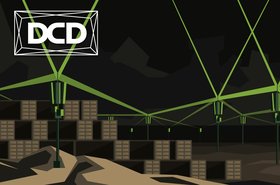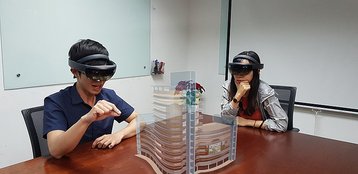When virtual and augmented reality became a physical reality just five or six years ago, there was a huge flurry of interest. Companies rushed to get headsets onto the market and software vendors, equally quickly, threw together applications that purported to take advantage of the technology.
However, the market quickly cooled as the novelty value wore off.
Over the past year, though, there has been increased adoption of VR and AR in particular niches as Covid-19 restrictions have made it harder for people to go on-site when they need to. Instead, companies like modular data center builder Kirby have been offering virtual tours using tools like Microsoft’s HoloLens – not just beforehand as a sales tool, but as a means of demonstrating progress during the build.
“Along with what Covid-19 has brought, with HoloLens you can walk through projects and do progress reports, showing how the project is being built because clients love to get to the site, but they can’t, in some cases. We're [also] doing factory acceptance tests and site acceptance tests through HoloLens and all that good stuff,” Kirby Group Managing Director Mark Flanagan told DCD’s George Rockett in a recent episode of the DCD>Talks series.
However, said Flanagan, HoloLens isn’t just being used by Kirby to walk clients through their build, it’s being used right from the very beginning of a project. “What we’re doing is, we’re sitting down with the design team. We go through it and we say, ‘This probably would work well,’ and then we demonstrate that virtually via a 3D modeler,” said Flanagan.
“What we’re trying to achieve is to take the challenges from a project and either have them resolved beforehand and then take them off-site – to take this virtual world and it real, it’s as simple as that,” said Flanagan.
“That works well to varying degrees. But, again, it's all about the person who’s sitting on the end, to be honest. And it's about always asking the right questions, and always coming up with the right solutions.”
Such tools are useful, continued Flanagan, because while Kirby’s products are big-ticket data center items, due to Covid-19 they have often been denied the opportunity to press flesh and do all the usual kinds of things they would normally do pre-purchase.
“Clients are more nervous now because they cannot get access to their projects, and they’re remote,” he said, adding that he was becoming more involved with clients as a result. “Trust is a big word for us… We want to be known as the most trusted provider of what we do, and you build trust by delivering, being honest.”
And all this has come at the same time that the market has shifted towards a higher degree of modularization, he added.
“There's probably been a paradigm shift over the last 18 months, and Covid has certainly pushed that on. What happened historically was that you had a conventional design, and then you modularized it as best as you could, the parts that you could.
“We're sitting down with the design teams… they are taking us in at an early stage, we're sitting down, and we're saying, ‘Okay, here's your design. But here's how you can modularize this and get it to save more quickly,’ because speed to market is so important at the moment.
“Now, design teams are pulling their design much, much further forward, because you need that extra time to actually build it off-site, and get it to site when you need it. That changes the design process because you have an added layer there [and] you have to make it constructible in a modular manner. We're doing a lot of exciting work with clients on that at the moment.”
Watch the full DCD>Talks discussion between Mark Flanagan and George Rockett here.
More news and videos...
-

Broadcast DCD>Building the Edge | Stream on-demand
How will the digital infrastructure ecosystem adapt to a compute revolution at the edge? -

How retail is being pushed towards Edge computing
The rise of online retail and the Covid-19 pandemic are driving store closures, so retailers need to get smarter about how they use technology at the Edge.

